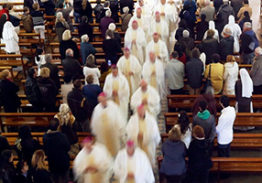
By Christopher White, The Tablet’s National Correspondent
NEW YORK – France’s first ever independent commission set up by the Catholic Church to examine claims of clergy sex abuse has now launched its appeal for witnesses to offer testimony.
The Catholic French bishops’ Independent Commission of Inquiry into Sexual Abuse within the Church (CAISE), which was formally established in November 2018, opened itself up for testimonials this week and will seek to chronicle clergy abuse dating back to the 1950s.
At the time of the announcement, Archbishop Georges Pontier of Marseille, who serves as president of the Conference of Bishops of France said that their November meeting “between the victims and the bishops has confirmed for us all, victims and bishops, the need to work together better in this fight.”
“The bishops wish to work with the victims to see how to make sure that our history doesn’t forget those acts that have left too many people to die,” he added.
Former deputy president of the French Council of State, Jean-Marc Sauvé, has been named the chairman of the commission, which includes 22 lawyers, theologians, and medical professionals, 12 of whom are men and 10 women. The body has pledged to deliver its full report by the end of 2020.
According to the official agreement signed between the French bishops and the head of the commission, the Bishops’ Conference will pay for all costs related to the review of cases, but the commission has been guaranteed full independence to review cases related to both the abuse of minors and vulnerable adults.
A letter dated Feb. 19, outlining the mandate of the commission, states that the first task will be to identify the number of both victims and perpetrators throughout the country.
The committee will also have two working groups, one of which is focused on the methodology for collecting information regarding the abuse and the other to focus on the legal issues involved in the cases.
In an interview with AFP, Sauvé said the commission will serve as “an important action to be able to give victims psychological or legal help.”
Victims who come forward will be able to call-in through an independent phone line or submit an e-mail detailing their allegations. Commissioners will then follow-up with in-person interviews during the second stage of the process.
Officials estimate that the first stage will be greeted with thousands of respondents.
The commission’s work comes at a time when the global Catholic Church is confronting another wave of clergy sex abuse.
In February, Pope Francis called the heads of every bishops’ conference from around the world for a four-day summit on sex abuse. During that time, he pledged an “all-out war” on abuse.
Last month, the Vatican issued new guidelines for bishop accountability, making it mandatory for all clerics and members of religious orders to report cases of clerical sexual abuse to Church authorities, including when committed by bishops or cardinals.
While France’s clergy abuse crisis has not been as dramatic as some countries in the Western world, in March of this year, French Cardinal Philippe Barbarin, the Archbishop of Lyon, was found guilty for failing to report abuse to authorities, making him one of the highest ranking Catholic officials to be convicted for an abuse related charge.
Immediately following his conviction, Barbarin, age 68, said he would offer his resignation to Pope Francis. Two weeks later, however, after meeting with the pope, the Holy Father rejected the resignation, citing the presumption of innocence while Barbarin awaits an appeal in his case.
In 2017, a French television investigation accused 25 bishops throughout the country of abuse or its cover-up. At the time, the Bishops’ Conference denied the allegations and said the investigators were attempting to blackmail the Church.
Looking ahead, Archbishop Pontier says he hopes that the work of the new commission will be aimed at “prevention,” in order to thwart future cases of abuse from occurring.
